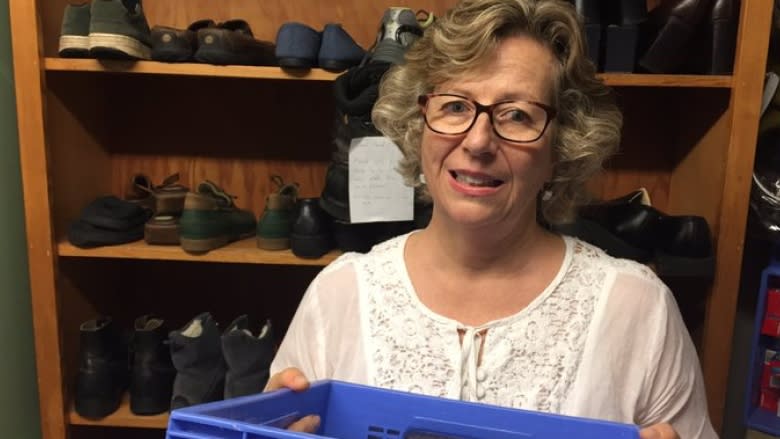Emergency shelter in downtown Truro sparks debate about homelessness
After a winter that saw a homeless man sleeping in a downtown Truro parking lot, volunteers at the town's emergency shelter are hoping to get the community involved in improving services for the homeless.
Since November, the Hub House has operated out of a former hair salon downtown, the first time a permanent shelter has been open on the main street.
Shelter volunteers say having the 15-bed facility in such a visible location is important, but that visibility means it's also become a source of debate at town council.
"Hub House was seen as detrimental to building up of a strong business community," said Jolene Reid, secretary for the Truro Homeless Outreach Society, which operates the shelter. "So our efforts to engage with businesses and town council are really seeking to enlighten folks about how necessary it is that we operate here."
The society is convening a working group called Unsheltered, which it hopes will bring together non-profits, the business community and all levels of government to better co-ordinate services for homeless people.
Part of that, Reid said, is recognizing that homeless people are part of the community, too.
"People require fair and equal access to services," she said. 'We need to talk to each other, to not be afraid to ask questions."
Rural homelessness a hidden phenomenon
Research suggests homelessness often looks different in small and rural communities than in large urban environments. Rather than staying in city shelters, people experiencing homelessness in smaller centres may sleep in makeshift shelters, couch surf or camp out.
The opening of Hub House made a hidden phenomenon more obvious. This was particularly true this past winter, when a man from the region spent part of the winter sleeping in the shelter's parking lot.
Truro Mayor Bill Mills said he started receiving calls about the man from residents and then from the shelter itself requesting an emergency meeting.
"We were just concerned with the mounting number of complaints that were coming our way, and the homeless society itself came to us looking for help. So that started the process and discussion of what we're going to do."
Balancing concerns
Since that meeting, Mills has asked the province for more support to address homelessness, especially when mental illness is involved.
His concerns include a possible link between the shelter and an increase in panhandling and petty crime.
"We have been getting complaints from our downtown merchants … [about] individuals begging for money, making rude remarks to shoppers," he said. "So again, we have the utmost respect for [the shelter], but also for our merchants. It's a tough go to keep a business afloat today, and anything that takes away from the shopping experience certainly is a detriment."
Mills said whether Truro has a homelessness issue is up for debate.
"From what I understand over the past few years, the number of homeless were minimal. So now we have a standalone shelter, and shelters in Amherst and New Glasgow close, guess what, they're coming, and the old adage, if you build it, they will come. So that's where we're at."
But Reid said the Truro Homeless Outreach Society's statistics show "the need is very high" in Truro.
Since November, the shelter has had over 1,200 visits, served 90 people and helped nine people find permanent housing. The shelter's position is that if there's an increase in visible poverty like panhandling in Truro, that's not necessarily linked to the shelter's presence, but rather reflects an underlying need.
Sent to Halifax
Before there was a shelter in town, Reid said one thing they'd heard was that homeless people in Truro were put on buses and sent to larger urban centres where they could access services.
Linda Wilson, executive director of Shelter Nova Scotia, said the organization does get people arriving at emergency shelters by bus and car from other parts of the province.
Just last week, "two different taxis from rural areas showed up at the men's shelter with two different gentlemen in the taxis," Wilson said. "They didn't pay for the taxis, both of them were not well.… It's quite something."
Wilson said once people arrive in Halifax, they're often without money or knowledge of the city, "and we don't have the staffing to support them to figure it out."
With Shelter Nova Scotia struggling to meet the needs of people already in Halifax, Wilson said people being sent from other parts of the province are simply being shuttled from one crisis to another.



